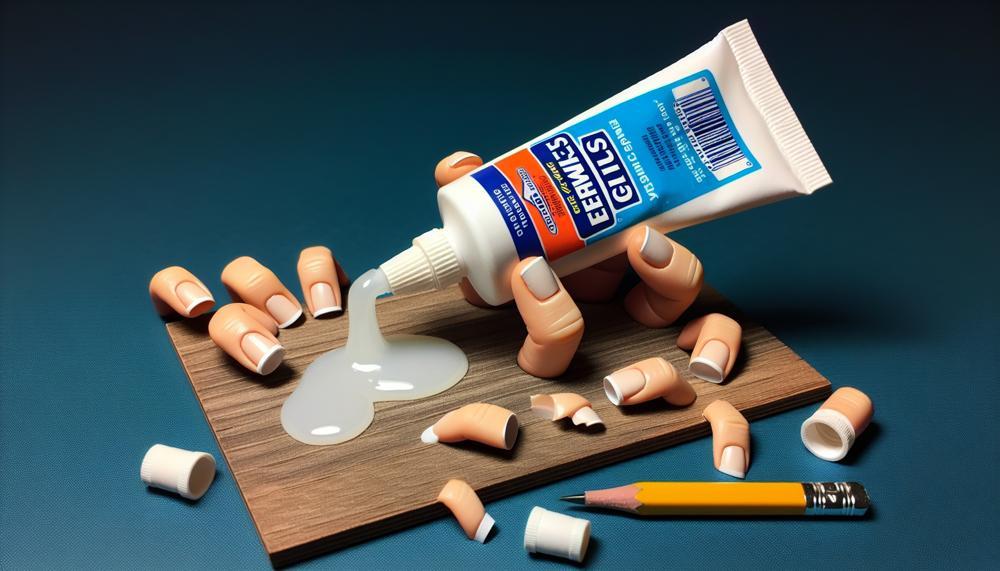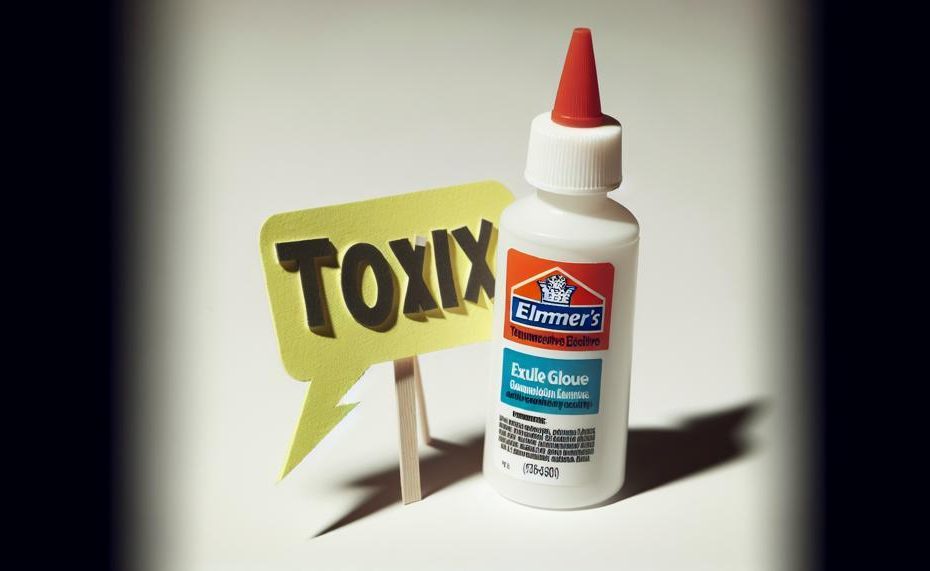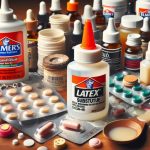Have you ever reached for a bottle of Elmer’s glue to fix a broken toy? Have you ever used it to create a masterpiece for your school project?
It’s a common household and classroom item. Have you ever thought about its potential toxicity? Surprisingly, this seemingly harmless adhesive may actually have some harmful effects.
In fact, there are concerning ingredients lurking in Elmer’s glue that may raise red flags. In this blog post, we’ll take a deep dive into the potential toxicity of Elmer’s glue. It’s crucial to be aware of what we’re using in our everyday activities.
So, grab your favorite snack and get ready to learn more about the potential dangers of Elmer’s glue.
Table of Contents
- 1 Elmer’s Glue is Non-Edible But Safe
- 2 What Is the Toxicity Level of Elmer’s Glue?
- 3 What Are the Ingredients of Elmer’s Glue?
- 4 Why Some People Think Elmer’s Glue Is Edible
- 5 Why Elmer’s Glue Isn’t Edible
- 6 Assessing the Effects of Elmer’s Glue on Skin
- 7 Exploring the Hazards of Inhaling Elmer’s Glue
- 8 Debunking Common Myths about Elmer’s Glue
- 9 Conclusion
Elmer’s Glue is Non-Edible But Safe
Yes, Elmer’s glue is completely safe to use, despite not being edible. It has been certified as non-toxic and adheres to all US federal safety and health regulations.
With a low level of toxicity, it is generally considered safe unless ingested in large quantities or in contact with sensitive skin. The glue’s ingredients are present in small amounts. They are both food-safe and non-toxic, making it safe to handle.
Once the glue has cured, it becomes a rigid polymer. It does not react, making it safe even if it comes into contact with the skin or is accidentally swallowed.
What Is the Toxicity Level of Elmer’s Glue?
Elmer’s glue is generally considered safe to use. However, users should be aware of potential health risks. They should take precautions to avoid them.
Potential Skin Irritation:
Elmer’s glue contains small amounts of latex. This can cause skin irritation for those with latex allergies.
To prevent this, avoid prolonged skin contact with the glue. Also, wear gloves when handling large amounts of the product.
Possible Ingestion Risks:
Although Elmer’s glue is non-toxic, consuming large amounts of it can cause discomfort such as upset stomach and nausea.
Therefore, it is important to keep the glue out of reach from children and pets and to seek medical attention if large amounts are consumed.
Inhalation Hazards:
Inhaling glue fumes can lead to poisoning, so it is important to avoid intentionally inhaling the fumes.
It is recommended to use the glue in a well-ventilated area and to avoid breathing in the fumes for an extended period of time.
To ensure safe usage of Elmer’s glue, here are some additional safety precautions:
- Keep out of reach from children and pets.
- Avoid contact with eyes and prolonged skin exposure.
- Use in a well-ventilated area.
- If using for extended periods or sensitive to fumes, wear a mask.
- In case of ingestion or skin irritation, seek medical attention.
- Store in a cool, dry place.
- Do not mix with other chemicals or use near open flames.
Elmer’s glue is considered safe for household use. However, users should be aware of potential health risks.
It is important to follow safety precautions. Use the product as directed to prevent harm.
Users can minimize potential risks by avoiding prolonged skin contact, keeping the glue out of reach from children and pets, and using it in a well-ventilated area.
Elmer’s glue is safer than industrial glues for household use. It has low toxicity and fewer VOCs.
What Are the Ingredients of Elmer’s Glue?
Elmer’s glue is generally considered safe. However, some types may contain hazardous ingredients such as formaldehyde or ammonia. These substances enhance the glue’s effectiveness. However, they can pose health risks if ingested or used incorrectly.
Therefore, it is crucial to carefully read and follow the instructions provided when using any art or craft supplies. This includes Elmer’s glue.
Those with known allergies or sensitivities should take extra care when using this product.
It is essential to understand the ingredients in Elmer’s glue to ensure safe and proper usage. The exact formulation may vary. The primary ingredients typically include water, polyvinyl acetate (PVA), and various additives. These additives include preservatives and thickeners.
PVA is a synthetic polymer that acts as the adhesive in the glue, allowing it to bond materials together.
The additives are used to improve the glue’s shelf life and consistency, making it easier to use.
Why Some People Think Elmer’s Glue Is Edible
Many believe that Elmer’s glue is edible, but this is far from the truth. Despite its popularity and effectiveness as an adhesive, Elmer’s glue is not safe for consumption. The chemicals and additives in its composition are not approved for human consumption and can pose potential health risks if ingested.
The FDA has strict regulations to ensure food safety. This includes guidelines for handling, processing, and labeling. However, these regulations do not apply to non-food items like Elmer’s glue. Therefore, it is not held to the same standards as food-safe products.
Fortunately, there are many food-safe alternatives available for use with edible items. These include flour and water paste, cornstarch glue, gelatin glue, sugar syrup glue, and edible icing or frosting. These options are specifically designed to be safe for consumption. You should always use them instead of non-food safe adhesives, like Elmer’s glue, when working with food.
Using non-food safe adhesives requires extra caution. For example, select the appropriate adhesive for the project. Use barriers or sealants when necessary. Work in well-ventilated areas. Avoid direct skin contact. Properly store adhesives. Dispose of them responsibly. It’s crucial to prioritize safety by using designated food-safe adhesives when working with food items.
Why Elmer’s Glue Isn’t Edible
Consuming Elmer’s Glue can have serious health consequences due to its non-food safe composition. The table below outlines some of the potential health risks associated with ingesting this adhesive.
| Health Risk | Description |
| Stomach Issues | The chemicals and additives in Elmer’s Glue are not approved for human consumption and can cause stomach problems if consumed. |
| Contamination of Food | If Elmer’s Glue is used on food items, it can contaminate the food and pose a risk to anyone who consumes it. |
| Injury from Physical Obstruction | If large amounts of glue are consumed, it can create a physical obstruction in the digestive system, leading to injury and potentially requiring medical intervention. |
| Toxicity | Ingesting large amounts of non-food safe adhesives, like Elmer’s Glue, can be toxic and lead to serious health issues. |
| Allergic Reactions | Some individuals may have allergic reactions to certain chemicals or additives in Elmer’s Glue, making it even more dangerous for consumption. |
Consuming Elmer’s Glue can pose potential health risks. It can also harm the environment. When disposed of improperly, the glue’s chemicals and additives can pollute water sources. This pollution can harm wildlife.
Therefore, it is crucial to always use designated food-safe adhesives when working with edible items.
This includes alternatives like flour and water paste, cornstarch glue, gelatin glue, sugar syrup glue, and edible icing or frosting.
Assessing the Effects of Elmer’s Glue on Skin
Elmer’s glue is a popular adhesive often used in arts and crafts projects. Although generally considered safe, it can harm the skin if not handled carefully. In this section, we will discuss the various impacts of Elmer’s glue on the skin. We will also explore ways to minimize or prevent them.
Skin Irritation and Allergic Reactions:
Elmer’s glue often irritates the skin and causes allergic reactions. This is due to the presence of chemicals such as polyvinyl acetate and methanol in the glue. They can cause redness, itching, and inflammation of the skin. In some cases, prolonged exposure or improper use of the glue can even lead to contact dermatitis. This is a more severe form of skin irritation.
To minimize or prevent these effects, it is essential to take necessary precautions when using Elmer’s glue. This includes ensuring that your skin is clean and dry before applying the glue. Avoid direct contact with it for extended periods. If you have sensitive skin, wear gloves while working with the glue. Alternatively, you can use a barrier cream. It creates a protective layer between your skin and the glue.
Prolonged Exposure and Ingestion:
Another potential risk of using Elmer’s glue on the skin is prolonged exposure or ingestion. This can happen when children use the glue for crafts. Adults might also accidentally ingest small amounts while working with it. Ingesting Elmer’s glue can cause stomach issues. These include nausea, vomiting, and constipation.
To avoid these effects, it is crucial to keep Elmer’s glue out of reach from children. Use designated food-safe alternatives when working with edible items. Additionally, wash your hands thoroughly after using the glue. This prevents accidental ingestion.
Alternative Glues:
If you experience skin reactions or sensitivity to Elmer’s glue, seek medical attention. You can also consider using alternative glues. For example, homemade flour paste or Mod Podge are non-toxic. They do not contain any harmful chemicals.
These alternatives are also easy to make and can be used for various arts and crafts projects.
Conclusion:
In conclusion, while Elmer’s glue is generally safe to use, it is crucial to handle it with care when using it on the skin.
Skin irritation, prolonged exposure, and ingestion are some of the common effects. You can minimize or avoid them by taking necessary precautions and seeking alternatives if needed.
Exploring the Hazards of Inhaling Elmer’s Glue
To understand the potential health risks of inhaling Elmer’s glue, you need to thoroughly understand its ingredients and proper usage. This popular adhesive is generally considered safe for external use. However, improper handling and misuse can lead to various health hazards.
Potential Health Risks:
Allergic Reactions:
As discussed earlier, some individuals may experience allergic reactions to Elmer’s glue. This can range from minor skin irritations to more severe respiratory issues. These include asthma attacks or difficulty breathing. If you encounter any symptoms after using Elmer’s glue, seek immediate medical attention. Also, stop using the glue.
Toxic Ingredients:
The main ingredient in Elmer’s glue is PVA. It is considered non-toxic. However, some formulations may contain harmful chemicals like formaldehyde or ammonia. These chemicals can be dangerous if ingested or inhaled. It is essential to carefully read the label and follow instructions to avoid any adverse effects.
Prevention and Safety Measures:
Proper Usage:
To ensure safety when using Elmer’s glue, follow the manufacturer’s instructions. This includes working in a well-ventilated area. Avoid ingesting or inhaling the glue, and keep it out of reach of children.
Alternative Options:
If you are worried about the health risks of inhaling Elmer’s glue, you have other options available. Some non-toxic and natural adhesives include vegetable-based glues and starch-based glues. You can also make your own flour and water-based adhesive.
Debunking Common Myths about Elmer’s Glue

The idea that Elmer’s glue is toxic and dangerous to use is simply not true. In fact, it has been certified as non-toxic. It adheres to all US federal safety and health regulations. While some may believe that the glue contains harmful ingredients, this is also a myth. The ingredients used in Elmer’s glue are actually safe and have a low toxicity level.
Another common misconception is that inhaling Elmer’s glue can cause serious health hazards. Inhaling any type of adhesive can be harmful. However, Elmer’s glue is safe for occasional use due to its low toxicity level.
Additionally, there is a belief that Elmer’s glue can cause skin irritation. This may be true for those allergic to latex. For most people, the glue is safe to use on the skin in small amounts.
Also Read: How To Get Hair Glue Out Of Carpet?
Conclusion
In conclusion, after examining the ingredients and potential risks of Elmer’s glue, it is evident that there may be some concerns. However, it remains a safe and popular item for households and classrooms.
Its low toxicity and food-safe ingredients make it suitable for many purposes. People use it for bookbinding and DIY projects. However, as with any product, precautions should be taken when handling the glue. Avoid ingestion or prolonged skin contact.
By understanding its ingredients and proper usage, we can confidently use Elmer’s glue without fear of harm.






